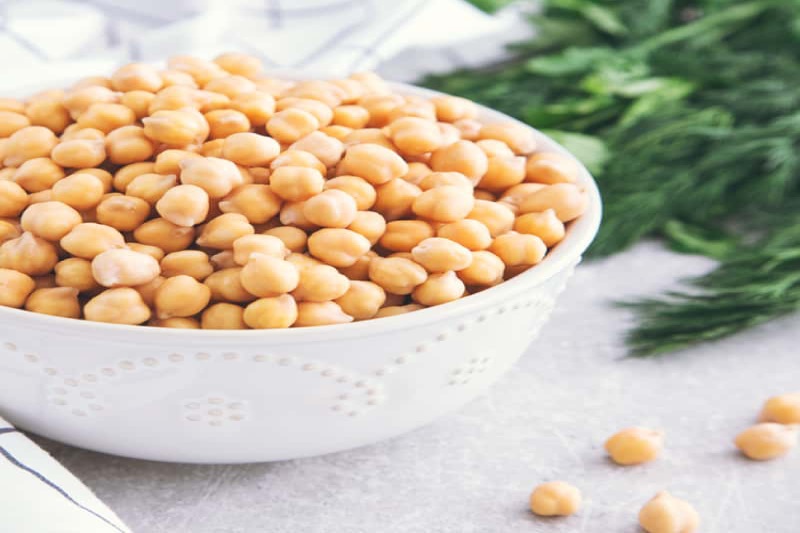Half a Cup of Chickpeas: Heart, Gut, and Weight Benefits

One plant-based protein that you should always have on hand in your cupboard is chickpeas. These robust beans are a cheap, practical, and wholesome staple that enhances virtually any dish with protein and fiber. Despite being referred to as beans frequently, they are actually a pulse, or the edible portion of the legume plant.
Regularly consuming chickpeas is really beneficial to your health. Studies have connected them to cancer prevention, diabetes control, heart health, gastrointestinal health, and weight loss. As an added bonus, aquafaba, the liquid used to can chickpeas, can be substituted for eggs in certain recipes.
Find out how nutritious chickpeas are and several tasty and inventive ways to incorporate them into your regular diet.
Facts About the Nutrition of Chickpeas
A serving of ½ cup canned chickpeas contains:
- 130 kcal
- seven grams of protein
- three grams of fat
- 20 grams of carbs
- 6.5 grams of fiber
- 1.8 mg of iron
The sodium level of canned chickpeas varies by brand since they are packaged in a salted mixture. But you can cut the salt content of chickpeas by up to 40% by washing them in cold water before eating.
Benefits of Lentils
One plant-based food that has several health advantages is chickpeas. Chickpeas contain more fiber than other pulses, according to study. In addition to its well-known function in facilitating digestion, fiber has been linked to reduced blood pressure and heart health. A serving of chickpeas can help you achieve roughly 25% of your daily fiber requirements, as the majority of Americans do not obtain the required 25 to 30 grams per day.
Chickpeas’ protein and fiber aid in maintaining a healthy weight. Consumers of chickpeas had a decreased risk of obesity than non-consumers, according to observational studies. Furthermore, a review of the literature revealed that pulse consumption increases the likelihood of weight loss even in the absence of calorie restriction.
Additionally, resistant starch—a kind of carbohydrate that is “resistant” to digestion—is present in chickpeas. Because of this, chickpeas digest more slowly, increasing satiety and lowering blood sugar rises. Research indicates that the resistant starch included in chickpeas triggers specific hormones that encourage the release of insulin, hence maintaining stable blood sugar levels following a meal.
In a similar vein, chickpeas may lower blood lipids such as cholesterol. Although dietary fiber from chickpeas is well known to improve heart health and lower cholesterol, research on animals indicates that it also has a good effect on gut flora and lowers triglycerides and cholesterol. Although research on animals may not necessarily apply to people, it is nonetheless a fascinating area of study.
Who is Against Chickpeas?
The drawbacks of eating chickpeas are quite minimal. Because the legume has a high fiber content, some people may feel flatulence. Chickpeas don’t produce as much gas as some other legumes, though. To decrease the possibility of gassiness, purchase dry chickpeas and prepare them yourself. This reduces the gas-producing carbs and might lessen flatulence.
Do Legumes Include Protein?
Chickpeas are a dependable plant-based protein source, with ½ cup containing 7 grams of protein. Research contradicts the widely held belief that plants do not possess all of the required amino acids. Chickpeas provide high levels of all the necessary amino acids (the ones that the body cannot manufacture) according to a 2023 analysis published in Food Science & Nutrition. As a result, chickpeas give a good protein boost to any meal and make a fantastic post-workout snack for building and recovering muscle.
Aquafaba: What is it?
The starchy liquid included in canned chickpeas is known as aquafaba, and it can occasionally be substituted for egg whites in plant-based baking. It’s true that aquafaba can be used to make plant-based whipped cream or vegan meringue. Aquafaba is easy to use. Instead of putting the canned chickpeas in a strainer and washing them with cold water, pour the liquid out of the beans and drain them into a basin. Once the liquid is set aside, you can use aqufaba in a straightforward recipe such as this Vegan Chocolate Mousse.